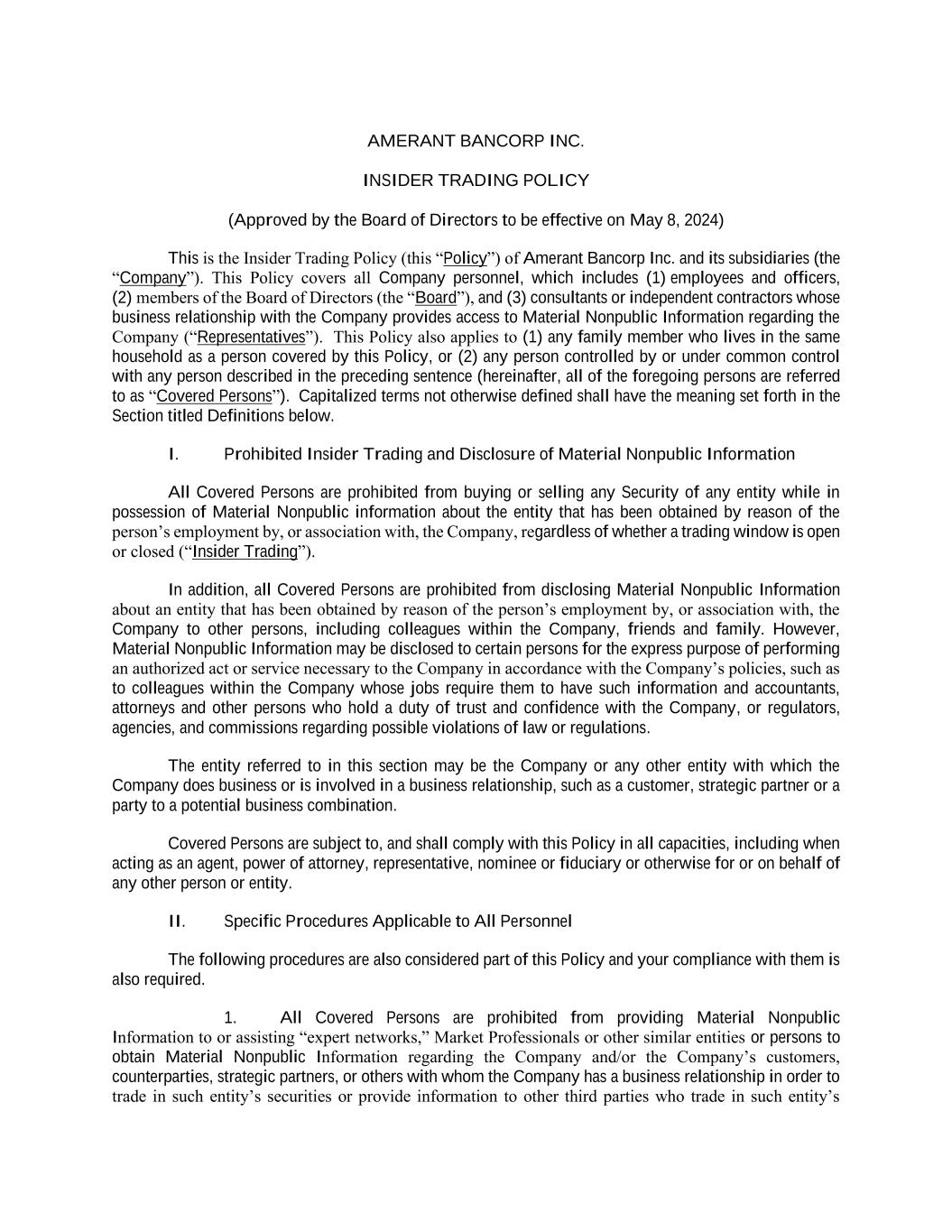
AMERANT BANCORP INC. INSIDER TRADING POLICY (Approved by the Board of Directors to be effective on May 8, 2024) This is the Insider Trading Policy (this “Policy”) of Amerant Bancorp Inc. and its subsidiaries (the “Company”). This Policy covers all Company personnel, which includes (1) employees and officers, (2) members of the Board of Directors (the “Board”), and (3) consultants or independent contractors whose business relationship with the Company provides access to Material Nonpublic Information regarding the Company (“Representatives”). This Policy also applies to (1) any family member who lives in the same household as a person covered by this Policy, or (2) any person controlled by or under common control with any person described in the preceding sentence (hereinafter, all of the foregoing persons are referred to as “Covered Persons”). Capitalized terms not otherwise defined shall have the meaning set forth in the Section titled Definitions below. I. Prohibited Insider Trading and Disclosure of Material Nonpublic Information All Covered Persons are prohibited from buying or selling any Security of any entity while in possession of Material Nonpublic information about the entity that has been obtained by reason of the person’s employment by, or association with, the Company, regardless of whether a trading window is open or closed (“Insider Trading”). In addition, all Covered Persons are prohibited from disclosing Material Nonpublic Information about an entity that has been obtained by reason of the person’s employment by, or association with, the Company to other persons, including colleagues within the Company, friends and family. However, Material Nonpublic Information may be disclosed to certain persons for the express purpose of performing an authorized act or service necessary to the Company in accordance with the Company’s policies, such as to colleagues within the Company whose jobs require them to have such information and accountants, attorneys and other persons who hold a duty of trust and confidence with the Company, or regulators, agencies, and commissions regarding possible violations of law or regulations. The entity referred to in this section may be the Company or any other entity with which the Company does business or is involved in a business relationship, such as a customer, strategic partner or a party to a potential business combination. Covered Persons are subject to, and shall comply with this Policy in all capacities, including when acting as an agent, power of attorney, representative, nominee or fiduciary or otherwise for or on behalf of any other person or entity. II. Specific Procedures Applicable to All Personnel The following procedures are also considered part of this Policy and your compliance with them is also required. 1. All Covered Persons are prohibited from providing Material Nonpublic Information to or assisting “expert networks,” Market Professionals or other similar entities or persons to obtain Material Nonpublic Information regarding the Company and/or the Company’s customers, counterparties, strategic partners, or others with whom the Company has a business relationship in order to trade in such entity’s securities or provide information to other third parties who trade in such entity’s
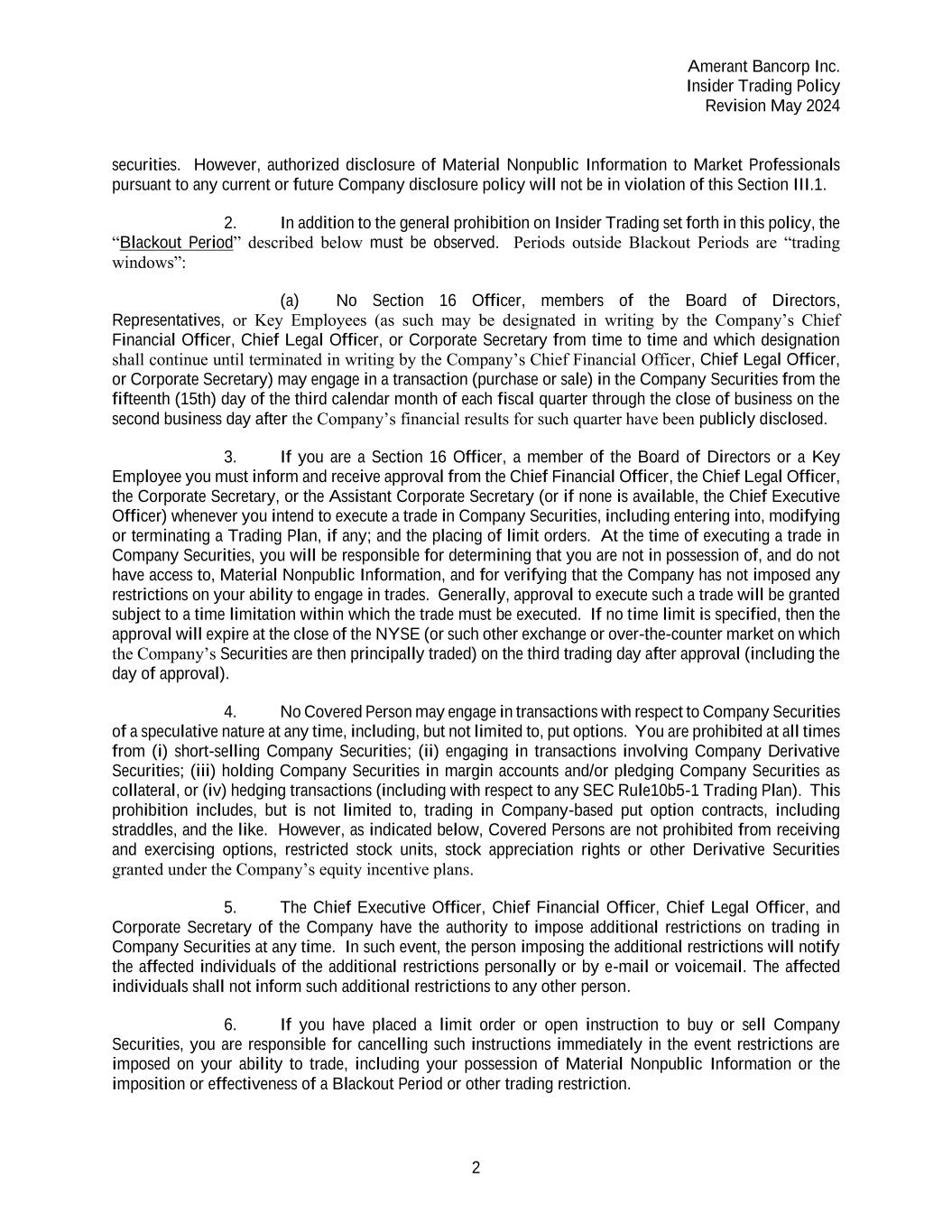
Amerant Bancorp Inc. Insider Trading Policy Revision May 2024 2 securities. However, authorized disclosure of Material Nonpublic Information to Market Professionals pursuant to any current or future Company disclosure policy will not be in violation of this Section III.1. 2. In addition to the general prohibition on Insider Trading set forth in this policy, the “Blackout Period” described below must be observed. Periods outside Blackout Periods are “trading windows”: (a) No Section 16 Officer, members of the Board of Directors, Representatives, or Key Employees (as such may be designated in writing by the Company’s Chief Financial Officer, Chief Legal Officer, or Corporate Secretary from time to time and which designation shall continue until terminated in writing by the Company’s Chief Financial Officer, Chief Legal Officer, or Corporate Secretary) may engage in a transaction (purchase or sale) in the Company Securities from the fifteenth (15th) day of the third calendar month of each fiscal quarter through the close of business on the second business day after the Company’s financial results for such quarter have been publicly disclosed. 3. If you are a Section 16 Officer, a member of the Board of Directors or a Key Employee you must inform and receive approval from the Chief Financial Officer, the Chief Legal Officer, the Corporate Secretary, or the Assistant Corporate Secretary (or if none is available, the Chief Executive Officer) whenever you intend to execute a trade in Company Securities, including entering into, modifying or terminating a Trading Plan, if any; and the placing of limit orders. At the time of executing a trade in Company Securities, you will be responsible for determining that you are not in possession of, and do not have access to, Material Nonpublic Information, and for verifying that the Company has not imposed any restrictions on your ability to engage in trades. Generally, approval to execute such a trade will be granted subject to a time limitation within which the trade must be executed. If no time limit is specified, then the approval will expire at the close of the NYSE (or such other exchange or over-the-counter market on which the Company’s Securities are then principally traded) on the third trading day after approval (including the day of approval). 4. No Covered Person may engage in transactions with respect to Company Securities of a speculative nature at any time, including, but not limited to, put options. You are prohibited at all times from (i) short-selling Company Securities; (ii) engaging in transactions involving Company Derivative Securities; (iii) holding Company Securities in margin accounts and/or pledging Company Securities as collateral, or (iv) hedging transactions (including with respect to any SEC Rule10b5-1 Trading Plan). This prohibition includes, but is not limited to, trading in Company-based put option contracts, including straddles, and the like. However, as indicated below, Covered Persons are not prohibited from receiving and exercising options, restricted stock units, stock appreciation rights or other Derivative Securities granted under the Company’s equity incentive plans. 5. The Chief Executive Officer, Chief Financial Officer, Chief Legal Officer, and Corporate Secretary of the Company have the authority to impose additional restrictions on trading in Company Securities at any time. In such event, the person imposing the additional restrictions will notify the affected individuals of the additional restrictions personally or by e-mail or voicemail. The affected individuals shall not inform such additional restrictions to any other person. 6. If you have placed a limit order or open instruction to buy or sell Company Securities, you are responsible for cancelling such instructions immediately in the event restrictions are imposed on your ability to trade, including your possession of Material Nonpublic Information or the imposition or effectiveness of a Blackout Period or other trading restriction.

Amerant Bancorp Inc. Insider Trading Policy Revision May 2024 3 7. Transactions that would otherwise be prohibited by this Policy are allowed if they are made pursuant to a Trading Plan. Any Trading Plan must be delivered promptly to the Chief Legal Officer, the Chief Financial Officer or the Corporate Secretary of the Company together with a written confirmation by the Covered Person that such plan meets the requirements of a Trading Plan and applicable law. 8. “Non-Market Transactions” are allowed even while in the possession of Material Nonpublic Information. Non-Market Transactions are: (a) Exercise of a stock option (without a subsequent or contemporaneous sale of Company Securities, including “cashless exercises”) under a Company equity incentive plan. (b) Acquisition of shares consistent with instructions established under a Company employee stock purchase plan without a subsequent sale of the shares. (c) Vesting of restricted stock, or the exercise of a tax withholding right pursuant to which an election is made to have the Company withhold shares of stock to satisfy tax withholding requirements upon the vesting of any restricted stock. (d) Bona fide gifts of Company Securities. However, whether a gift is bona fide will depend on the circumstances surrounding each gift, including the donor’s relationship with the recipient and the nature of the tax benefit of the donor. If you are uncertain as to whether a gift is bona fide, you should contact the Chief Legal Officer, Corporate Secretary or Assistant Corporate Secretary for clarification. (e) A specific, non-market transaction approved in writing in advance by the Company’s Chief Financial Officer, the Chief Legal Officer, the Corporate Secretary or Assistant Corporate Secretary (or if unavailable, the Chief Executive Officer). 9. If you receive an outside request for information, comments or interviews regarding the Company (other than routine product inquiries) that may result in the dissemination of Material Nonpublic Information, you must direct the request to the Chief Financial Officer or the Investor Relations Officer so that an authorized spokesperson of the Company may determine whether or how to respond to the request consistent with the Company’s obligations under Regulation Fair Disclosure. III. Additional Procedures Applicable to Section 16 Officers and Members of the Board Section 16 Officers and members of the Board of Directors may not engage in any transaction in Company Securities (including purchasing, selling, or gifting Company Securities), without first obtaining pre-clearance of the transaction from the Chief Legal Officer, Corporate Secretary or Assistant Corporate Secretary. Section 16 Officers and members of the Board of Directors are required to notify the Chief Legal Officer, Corporate Secretary, or Assistant Secretary promptly upon the completion of any pre-cleared transaction so that a Form 4 may be timely prepared and filed with the SEC by the Company on behalf of such Section 16 Reporting Person. However, the completion, contents and filing of any Section 16 filing is the sole responsibility of each Section 16 Officer, member of the Board or other reporting person, as applicable. Members of the Board of Directors and Section 16 Officers must comply with the reporting obligations and limitations on short-swing transactions set forth in Section 16 of the Exchange Act.
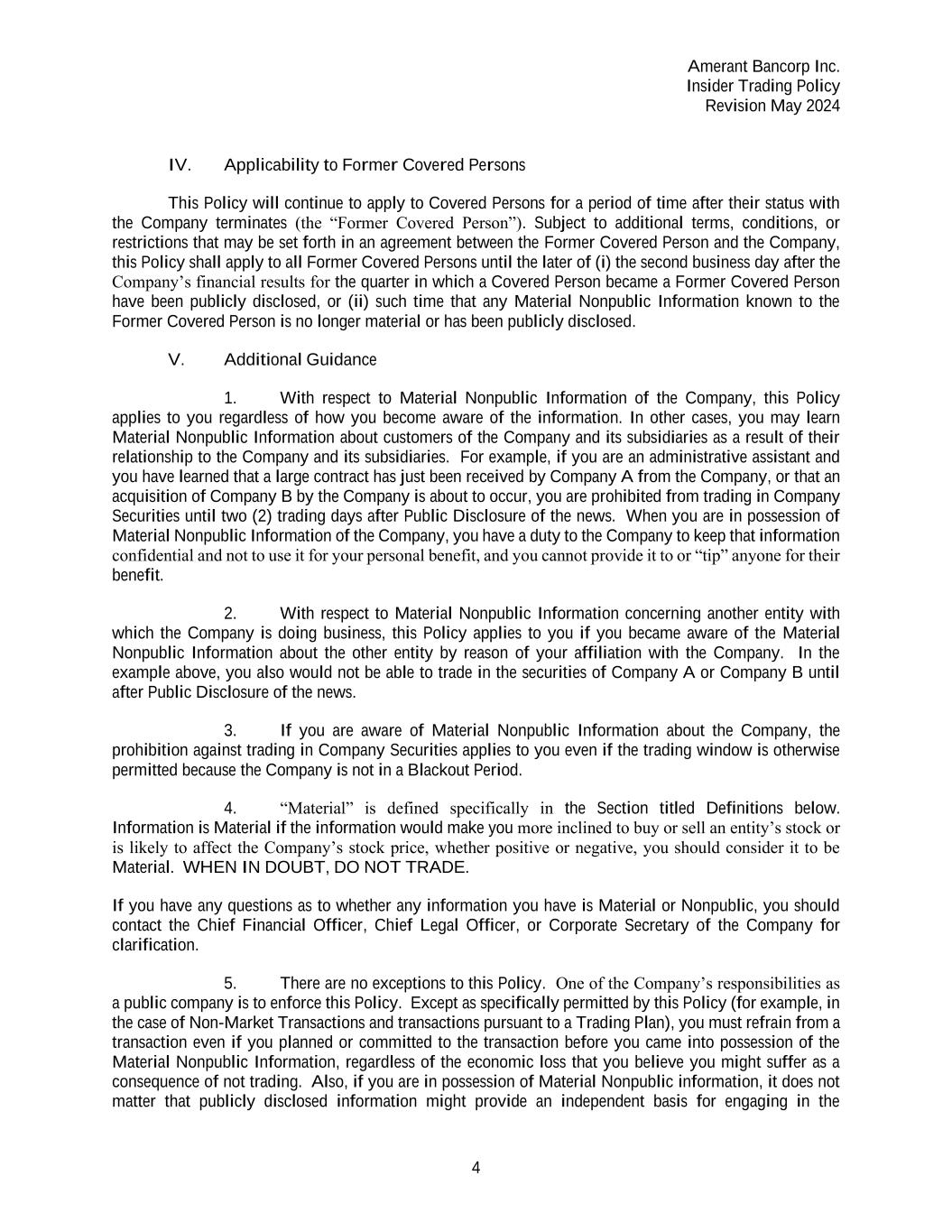
Amerant Bancorp Inc. Insider Trading Policy Revision May 2024 4 IV. Applicability to Former Covered Persons This Policy will continue to apply to Covered Persons for a period of time after their status with the Company terminates (the “Former Covered Person”). Subject to additional terms, conditions, or restrictions that may be set forth in an agreement between the Former Covered Person and the Company, this Policy shall apply to all Former Covered Persons until the later of (i) the second business day after the Company’s financial results for the quarter in which a Covered Person became a Former Covered Person have been publicly disclosed, or (ii) such time that any Material Nonpublic Information known to the Former Covered Person is no longer material or has been publicly disclosed. V. Additional Guidance 1. With respect to Material Nonpublic Information of the Company, this Policy applies to you regardless of how you become aware of the information. In other cases, you may learn Material Nonpublic Information about customers of the Company and its subsidiaries as a result of their relationship to the Company and its subsidiaries. For example, if you are an administrative assistant and you have learned that a large contract has just been received by Company A from the Company, or that an acquisition of Company B by the Company is about to occur, you are prohibited from trading in Company Securities until two (2) trading days after Public Disclosure of the news. When you are in possession of Material Nonpublic Information of the Company, you have a duty to the Company to keep that information confidential and not to use it for your personal benefit, and you cannot provide it to or “tip” anyone for their benefit. 2. With respect to Material Nonpublic Information concerning another entity with which the Company is doing business, this Policy applies to you if you became aware of the Material Nonpublic Information about the other entity by reason of your affiliation with the Company. In the example above, you also would not be able to trade in the securities of Company A or Company B until after Public Disclosure of the news. 3. If you are aware of Material Nonpublic Information about the Company, the prohibition against trading in Company Securities applies to you even if the trading window is otherwise permitted because the Company is not in a Blackout Period. 4. “Material” is defined specifically in the Section titled Definitions below. Information is Material if the information would make you more inclined to buy or sell an entity’s stock or is likely to affect the Company’s stock price, whether positive or negative, you should consider it to be Material. WHEN IN DOUBT, DO NOT TRADE. If you have any questions as to whether any information you have is Material or Nonpublic, you should contact the Chief Financial Officer, Chief Legal Officer, or Corporate Secretary of the Company for clarification. 5. There are no exceptions to this Policy. One of the Company’s responsibilities as a public company is to enforce this Policy. Except as specifically permitted by this Policy (for example, in the case of Non-Market Transactions and transactions pursuant to a Trading Plan), you must refrain from a transaction even if you planned or committed to the transaction before you came into possession of the Material Nonpublic Information, regardless of the economic loss that you believe you might suffer as a consequence of not trading. Also, if you are in possession of Material Nonpublic information, it does not matter that publicly disclosed information might provide an independent basis for engaging in the
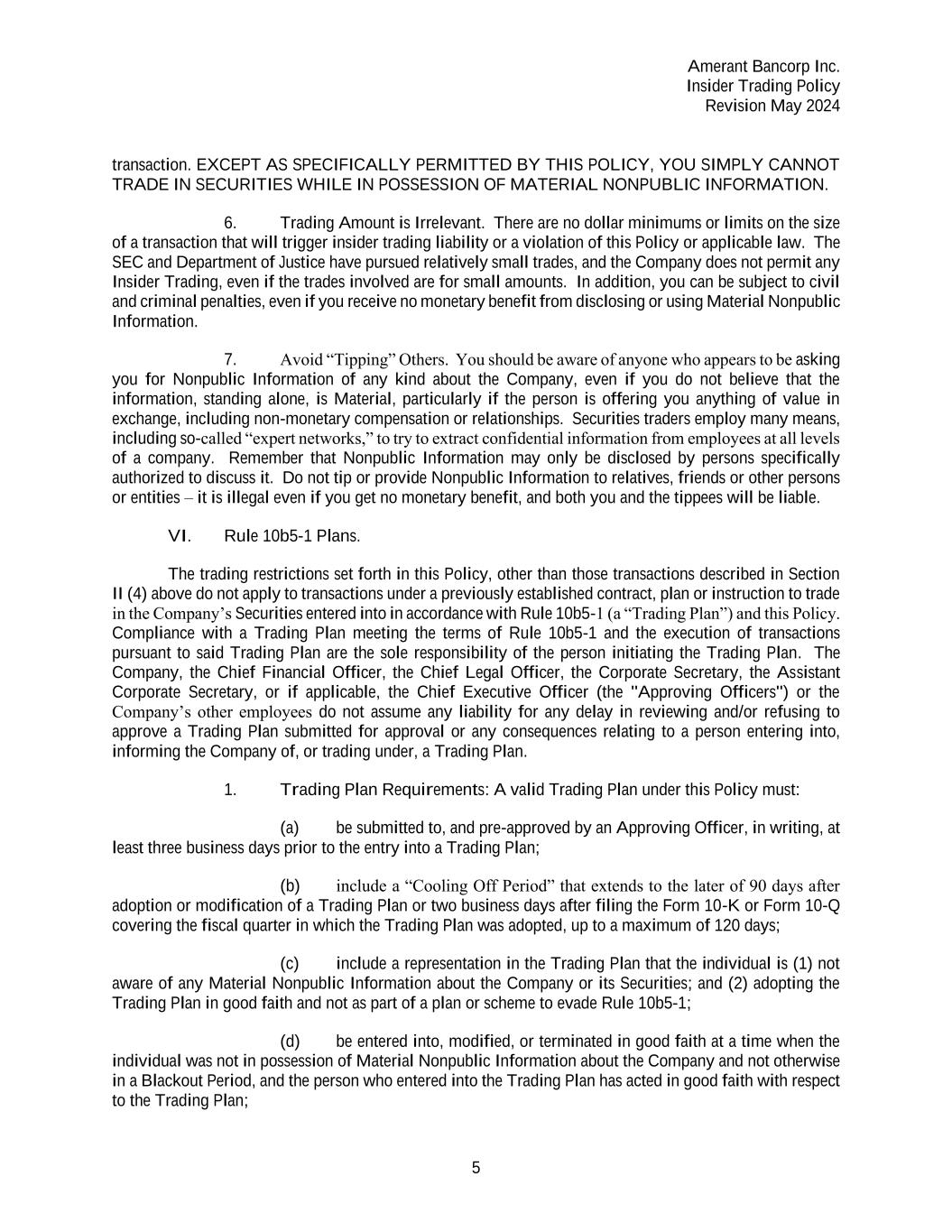
Amerant Bancorp Inc. Insider Trading Policy Revision May 2024 5 transaction. EXCEPT AS SPECIFICALLY PERMITTED BY THIS POLICY, YOU SIMPLY CANNOT TRADE IN SECURITIES WHILE IN POSSESSION OF MATERIAL NONPUBLIC INFORMATION. 6. Trading Amount is Irrelevant. There are no dollar minimums or limits on the size of a transaction that will trigger insider trading liability or a violation of this Policy or applicable law. The SEC and Department of Justice have pursued relatively small trades, and the Company does not permit any Insider Trading, even if the trades involved are for small amounts. In addition, you can be subject to civil and criminal penalties, even if you receive no monetary benefit from disclosing or using Material Nonpublic Information. 7. Avoid “Tipping” Others. You should be aware of anyone who appears to be asking you for Nonpublic Information of any kind about the Company, even if you do not believe that the information, standing alone, is Material, particularly if the person is offering you anything of value in exchange, including non-monetary compensation or relationships. Securities traders employ many means, including so-called “expert networks,” to try to extract confidential information from employees at all levels of a company. Remember that Nonpublic Information may only be disclosed by persons specifically authorized to discuss it. Do not tip or provide Nonpublic Information to relatives, friends or other persons or entities – it is illegal even if you get no monetary benefit, and both you and the tippees will be liable. VI. Rule 10b5-1 Plans. The trading restrictions set forth in this Policy, other than those transactions described in Section II (4) above do not apply to transactions under a previously established contract, plan or instruction to trade in the Company’s Securities entered into in accordance with Rule 10b5-1 (a “Trading Plan”) and this Policy. Compliance with a Trading Plan meeting the terms of Rule 10b5-1 and the execution of transactions pursuant to said Trading Plan are the sole responsibility of the person initiating the Trading Plan. The Company, the Chief Financial Officer, the Chief Legal Officer, the Corporate Secretary, the Assistant Corporate Secretary, or if applicable, the Chief Executive Officer (the "Approving Officers") or the Company’s other employees do not assume any liability for any delay in reviewing and/or refusing to approve a Trading Plan submitted for approval or any consequences relating to a person entering into, informing the Company of, or trading under, a Trading Plan. 1. Trading Plan Requirements: A valid Trading Plan under this Policy must: (a) be submitted to, and pre-approved by an Approving Officer, in writing, at least three business days prior to the entry into a Trading Plan; (b) include a “Cooling Off Period” that extends to the later of 90 days after adoption or modification of a Trading Plan or two business days after filing the Form 10-K or Form 10-Q covering the fiscal quarter in which the Trading Plan was adopted, up to a maximum of 120 days; (c) include a representation in the Trading Plan that the individual is (1) not aware of any Material Nonpublic Information about the Company or its Securities; and (2) adopting the Trading Plan in good faith and not as part of a plan or scheme to evade Rule 10b5-1; (d) be entered into, modified, or terminated in good faith at a time when the individual was not in possession of Material Nonpublic Information about the Company and not otherwise in a Blackout Period, and the person who entered into the Trading Plan has acted in good faith with respect to the Trading Plan;
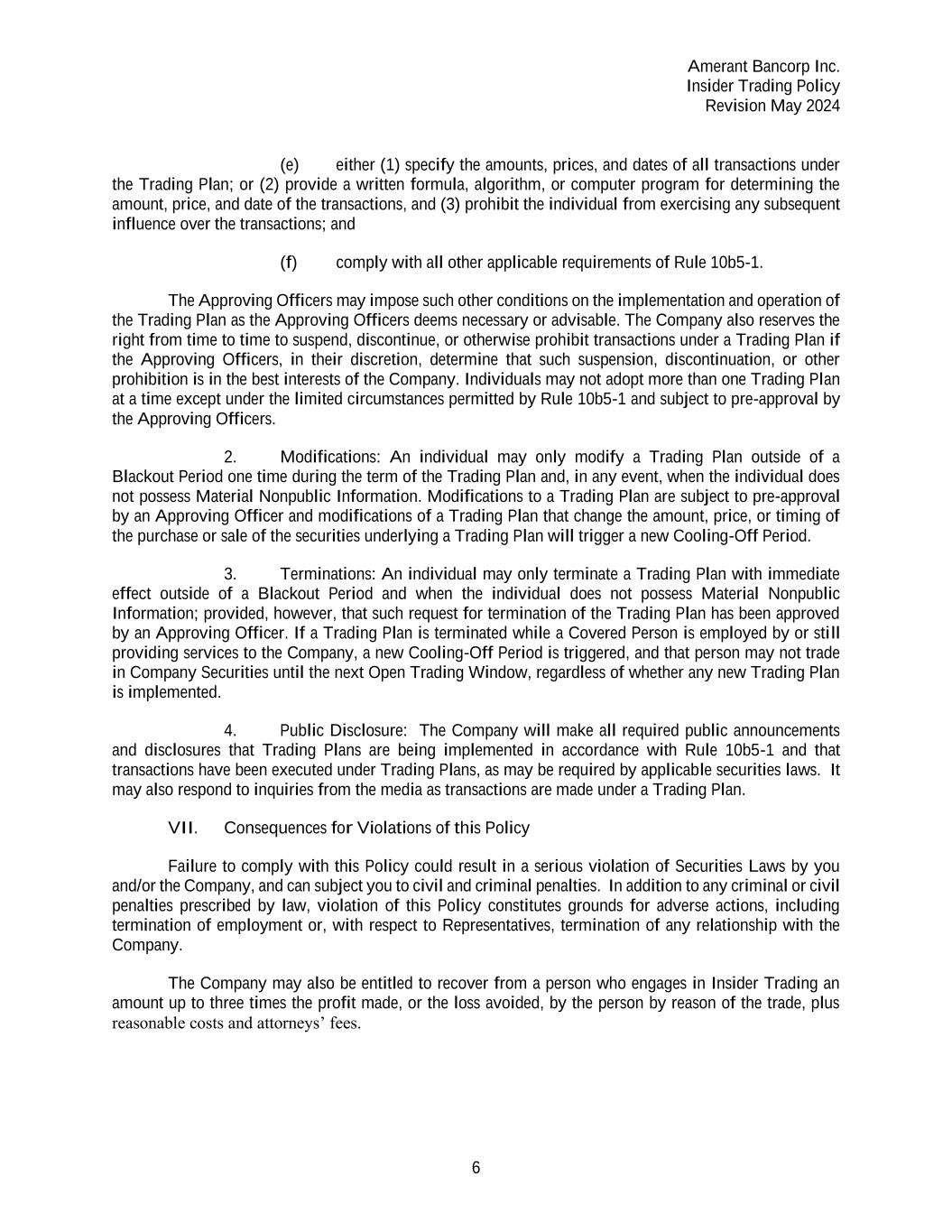
Amerant Bancorp Inc. Insider Trading Policy Revision May 2024 6 (e) either (1) specify the amounts, prices, and dates of all transactions under the Trading Plan; or (2) provide a written formula, algorithm, or computer program for determining the amount, price, and date of the transactions, and (3) prohibit the individual from exercising any subsequent influence over the transactions; and (f) comply with all other applicable requirements of Rule 10b5-1. The Approving Officers may impose such other conditions on the implementation and operation of the Trading Plan as the Approving Officers deems necessary or advisable. The Company also reserves the right from time to time to suspend, discontinue, or otherwise prohibit transactions under a Trading Plan if the Approving Officers, in their discretion, determine that such suspension, discontinuation, or other prohibition is in the best interests of the Company. Individuals may not adopt more than one Trading Plan at a time except under the limited circumstances permitted by Rule 10b5-1 and subject to pre-approval by the Approving Officers. 2. Modifications: An individual may only modify a Trading Plan outside of a Blackout Period one time during the term of the Trading Plan and, in any event, when the individual does not possess Material Nonpublic Information. Modifications to a Trading Plan are subject to pre-approval by an Approving Officer and modifications of a Trading Plan that change the amount, price, or timing of the purchase or sale of the securities underlying a Trading Plan will trigger a new Cooling-Off Period. 3. Terminations: An individual may only terminate a Trading Plan with immediate effect outside of a Blackout Period and when the individual does not possess Material Nonpublic Information; provided, however, that such request for termination of the Trading Plan has been approved by an Approving Officer. If a Trading Plan is terminated while a Covered Person is employed by or still providing services to the Company, a new Cooling-Off Period is triggered, and that person may not trade in Company Securities until the next Open Trading Window, regardless of whether any new Trading Plan is implemented. 4. Public Disclosure: The Company will make all required public announcements and disclosures that Trading Plans are being implemented in accordance with Rule 10b5-1 and that transactions have been executed under Trading Plans, as may be required by applicable securities laws. It may also respond to inquiries from the media as transactions are made under a Trading Plan. VII. Consequences for Violations of this Policy Failure to comply with this Policy could result in a serious violation of Securities Laws by you and/or the Company, and can subject you to civil and criminal penalties. In addition to any criminal or civil penalties prescribed by law, violation of this Policy constitutes grounds for adverse actions, including termination of employment or, with respect to Representatives, termination of any relationship with the Company. The Company may also be entitled to recover from a person who engages in Insider Trading an amount up to three times the profit made, or the loss avoided, by the person by reason of the trade, plus reasonable costs and attorneys’ fees.
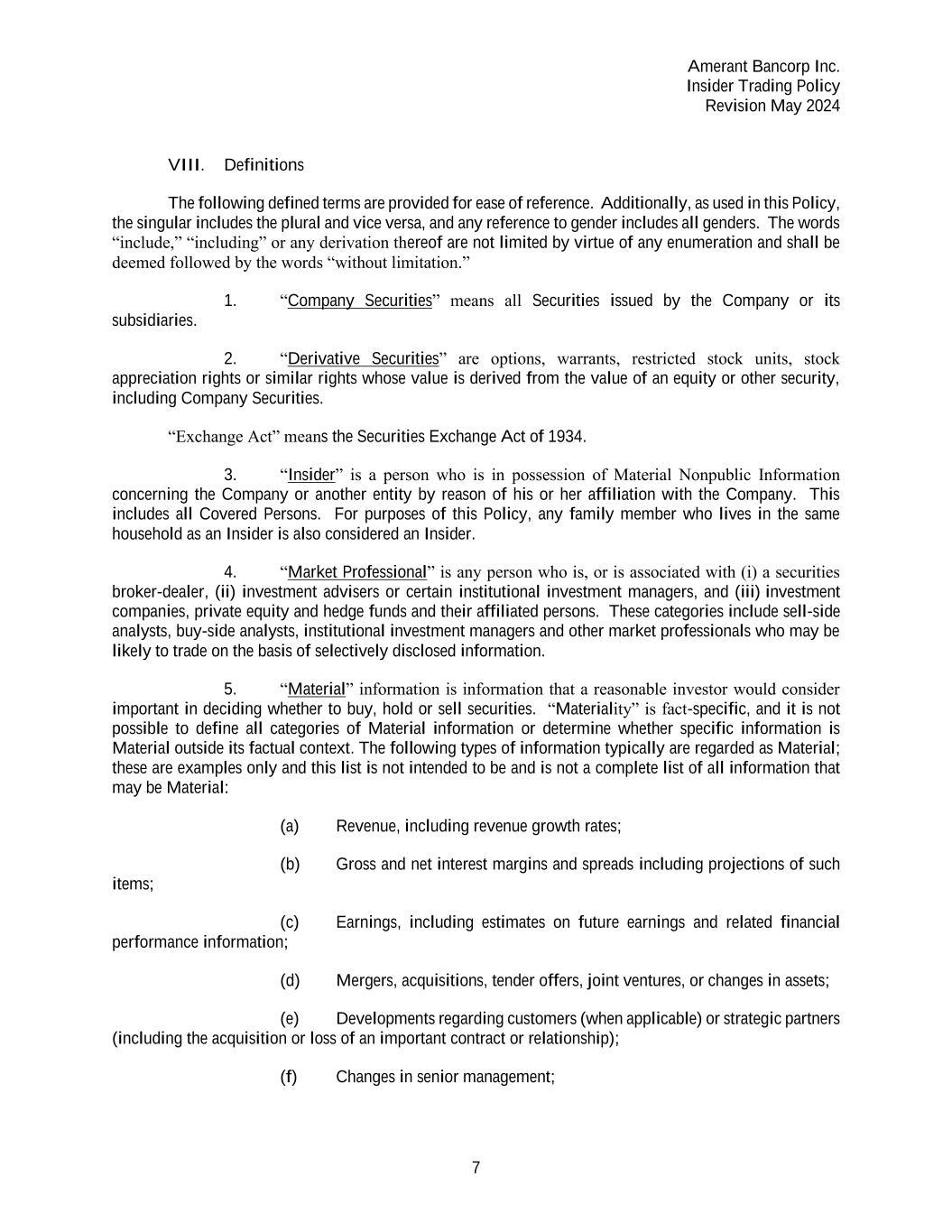
Amerant Bancorp Inc. Insider Trading Policy Revision May 2024 7 VIII. Definitions The following defined terms are provided for ease of reference. Additionally, as used in this Policy, the singular includes the plural and vice versa, and any reference to gender includes all genders. The words “include,” “including” or any derivation thereof are not limited by virtue of any enumeration and shall be deemed followed by the words “without limitation.” 1. “Company Securities” means all Securities issued by the Company or its subsidiaries. 2. “Derivative Securities” are options, warrants, restricted stock units, stock appreciation rights or similar rights whose value is derived from the value of an equity or other security, including Company Securities. “Exchange Act” means the Securities Exchange Act of 1934. 3. “Insider” is a person who is in possession of Material Nonpublic Information concerning the Company or another entity by reason of his or her affiliation with the Company. This includes all Covered Persons. For purposes of this Policy, any family member who lives in the same household as an Insider is also considered an Insider. 4. “Market Professional” is any person who is, or is associated with (i) a securities broker-dealer, (ii) investment advisers or certain institutional investment managers, and (iii) investment companies, private equity and hedge funds and their affiliated persons. These categories include sell-side analysts, buy-side analysts, institutional investment managers and other market professionals who may be likely to trade on the basis of selectively disclosed information. 5. “Material” information is information that a reasonable investor would consider important in deciding whether to buy, hold or sell securities. “Materiality” is fact-specific, and it is not possible to define all categories of Material information or determine whether specific information is Material outside its factual context. The following types of information typically are regarded as Material; these are examples only and this list is not intended to be and is not a complete list of all information that may be Material: (a) Revenue, including revenue growth rates; (b) Gross and net interest margins and spreads including projections of such items; (c) Earnings, including estimates on future earnings and related financial performance information; (d) Mergers, acquisitions, tender offers, joint ventures, or changes in assets; (e) Developments regarding customers (when applicable) or strategic partners (including the acquisition or loss of an important contract or relationship); (f) Changes in senior management;
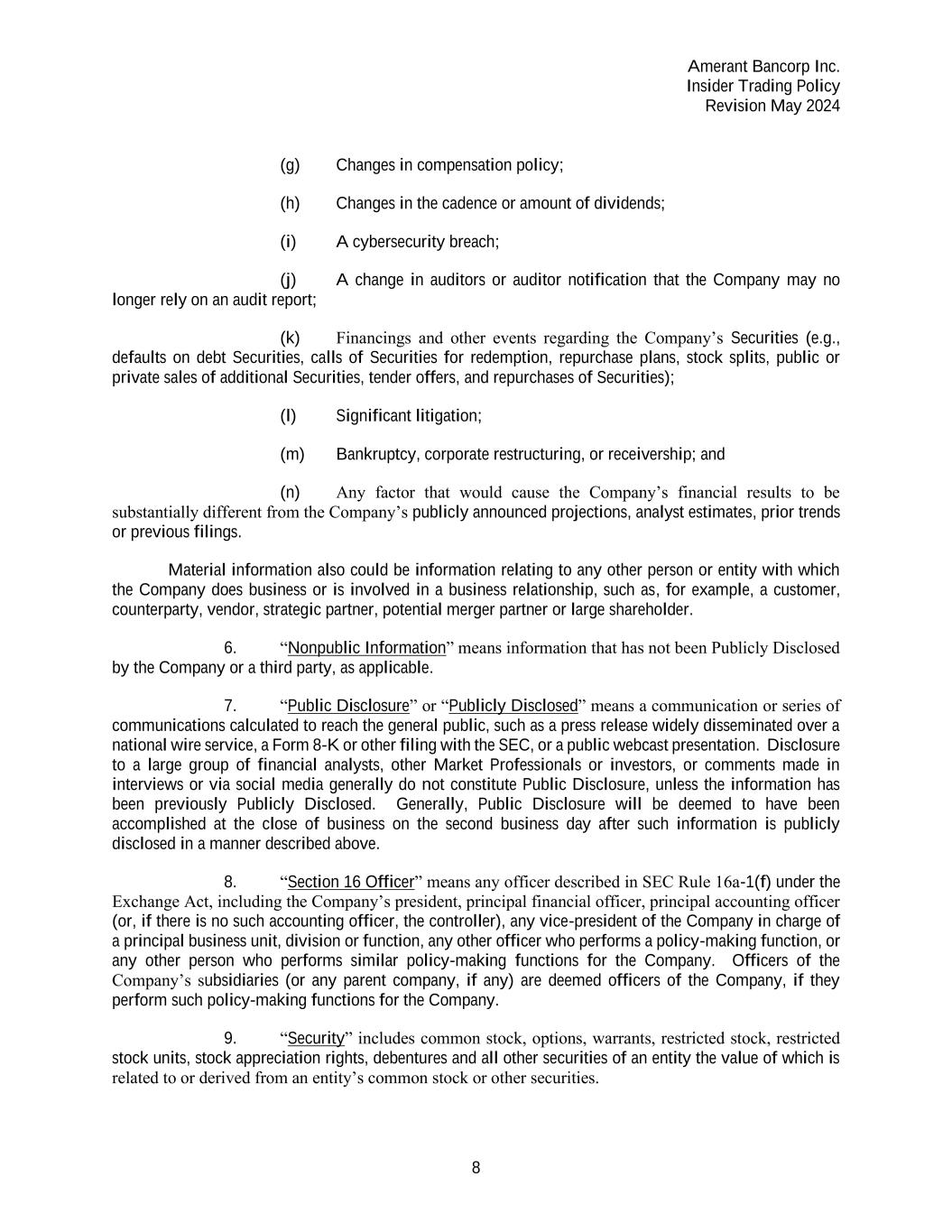
Amerant Bancorp Inc. Insider Trading Policy Revision May 2024 8 (g) Changes in compensation policy; (h) Changes in the cadence or amount of dividends; (i) A cybersecurity breach; (j) A change in auditors or auditor notification that the Company may no longer rely on an audit report; (k) Financings and other events regarding the Company’s Securities (e.g., defaults on debt Securities, calls of Securities for redemption, repurchase plans, stock splits, public or private sales of additional Securities, tender offers, and repurchases of Securities); (l) Significant litigation; (m) Bankruptcy, corporate restructuring, or receivership; and (n) Any factor that would cause the Company’s financial results to be substantially different from the Company’s publicly announced projections, analyst estimates, prior trends or previous filings. Material information also could be information relating to any other person or entity with which the Company does business or is involved in a business relationship, such as, for example, a customer, counterparty, vendor, strategic partner, potential merger partner or large shareholder. 6. “Nonpublic Information” means information that has not been Publicly Disclosed by the Company or a third party, as applicable. 7. “Public Disclosure” or “Publicly Disclosed” means a communication or series of communications calculated to reach the general public, such as a press release widely disseminated over a national wire service, a Form 8-K or other filing with the SEC, or a public webcast presentation. Disclosure to a large group of financial analysts, other Market Professionals or investors, or comments made in interviews or via social media generally do not constitute Public Disclosure, unless the information has been previously Publicly Disclosed. Generally, Public Disclosure will be deemed to have been accomplished at the close of business on the second business day after such information is publicly disclosed in a manner described above. 8. “Section 16 Officer” means any officer described in SEC Rule 16a-1(f) under the Exchange Act, including the Company’s president, principal financial officer, principal accounting officer (or, if there is no such accounting officer, the controller), any vice-president of the Company in charge of a principal business unit, division or function, any other officer who performs a policy-making function, or any other person who performs similar policy-making functions for the Company. Officers of the Company’s subsidiaries (or any parent company, if any) are deemed officers of the Company, if they perform such policy-making functions for the Company. 9. “Security” includes common stock, options, warrants, restricted stock, restricted stock units, stock appreciation rights, debentures and all other securities of an entity the value of which is related to or derived from an entity’s common stock or other securities.

Amerant Bancorp Inc. Insider Trading Policy Revision May 2024 9 10. “Securities Laws” means the Securities Act of 1933, the Exchange Act (together with the Securities Act of 1933 (the “U.S. Securities Laws”), all applicable state securities or “blue sky” laws , and all applicable non-U.S. securities laws.